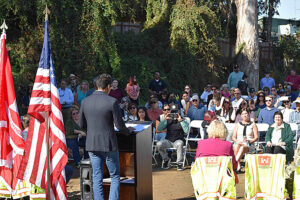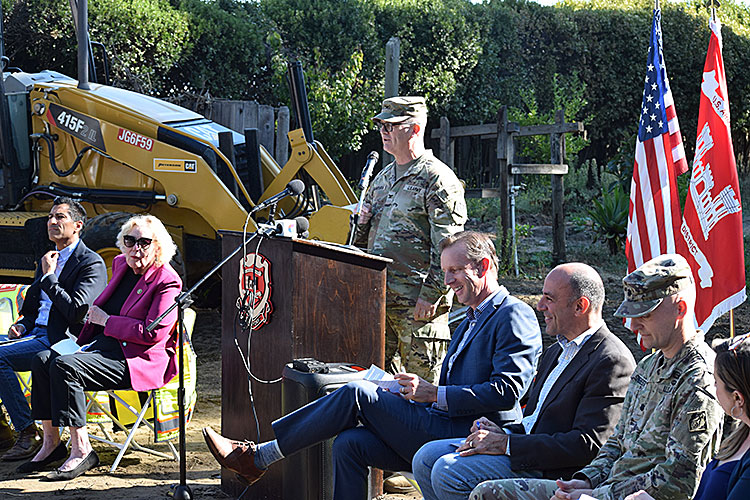On Oct. 2, local, state and federal officials hosted a ceremonial groundbreaking, signaling that the $599 million Pajaro River levee project bordering Watsonville and Monterey County is about to begin, aiming to provide 100-year flood protection to the oft-flooded community of Pajaro.
 A massive levee breach in March 2023 sent six feet of water flooding through homes, businesses and fields, forcing hundreds to evacuate, closing Pajaro Middle School until August 2024 and leaving standing water for farmers who had expected to be planting soon.
A massive levee breach in March 2023 sent six feet of water flooding through homes, businesses and fields, forcing hundreds to evacuate, closing Pajaro Middle School until August 2024 and leaving standing water for farmers who had expected to be planting soon.
These 75-year-old undersized levees first failed in 1955. Since then, residents of Watsonville and the town of Pajaro have lived in fear of the next big flood.
The huge project is to be built in phases and take five years – 2030.
Vegetation removal, utility relocation and other site preparation begin this month, with civil construction starting early next year.
The timing of the ceremony was good for county Supervisor Zach Friend, chair of the Pajaro Regional Flood Management Agency, who is about to step down after 12 years representing the Second District.
 For years, he has advocated for federal and state agencies to give higher priority to the levee project.
For years, he has advocated for federal and state agencies to give higher priority to the levee project.
Members of the low-income community did not have resources to provide the required match for federal funds, and the state Legislature stepped in to fill this gap.
The US Army Corps of Engineers is covering 65% of project construction costs, about $389.5 million.
The non-federal cost share of $209.5 million will be fully funded by the State Department of Water Resources, a first for a project of its kind in California.
That includes advancing these State funds to Pajaro Regional Flood Management Agency as the non-federal sponsor to secure right-of-way and property acquisition necessary for construction and long-term maintenance of levee improvements.
“The groundbreaking is a turning of the page from decades of fighting for this project to the beginning of a handful of years of construction of the project,” Friend said. “We are not out of the woods yet and know that we still have multiple winters ahead of us during construction, but we can see the path that takes us out of the woods and it begins now with this groundbreaking in Watsonville.”
Other speakers included: Col. James Handura and Lt. Col. Timothy Shebesta of the US Army Corps of Engineers, Congressman Jimmy Panetta and Congresswoman Zoe Lofgren, Assembly Speaker Robert Rivas, State Sen. John Laird, and California Department of Water Resources Deputy Director Laura Hollender.
The US Army Corps of Engineers, with the Pajaro Regional Flood Management Agency and the California Department of Water Resources, are to build and improve levees along both the lower Pajaro River and Corralitos and Salsipuedes Creeks.
The long-awaited project has garnered support and funding from the Biden administration for its alignment with Biden’s Environmental Justice 40 initiative, which facilitates the equitable delivery of public safety improvements for historically underserved, economically disadvantaged communities.
The focus of the groundbreaking is construction known as Reach 6, which involves building new levees where none currently exist along ~2.5 miles of Corralitos Creek, between Green Valley and East Lake Roads.
In January 2023, floodwaters overtopped the creek’s banks four times within this reach, flooding two large senior living communities in Watsonville.
According to the Army Corps, the levee project will provide benefits beyond flood risk reduction, including ecological enhancements and groundwater recharge.
Borrow material from excavations within the floodplain are expected to significantly reduce the amount of material that would be imported for levee construction, reducing project costs.
These features align with Army Corps’ Engineering with Nature principles.
•••
More information is at www.spn.usace.army.mil/Missions/Projects-and-Programs/Current-Projects/Pajaro-River-Watsonville/.
Photos Credit: Jason Hoppin



